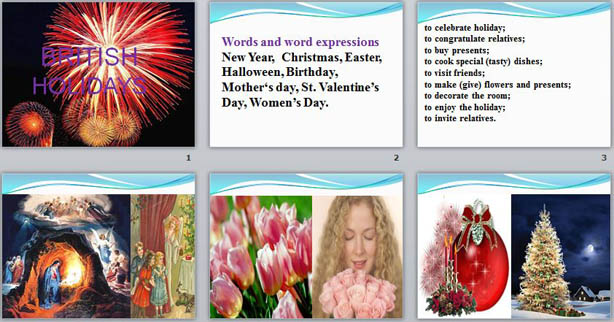Цель урока:
- познакомить учащихся с британскими праздниками.
Задачи урока:
1) тренировать изученную лексику по теме «Праздники»
2) формировать навыки монологической речи и чтения
3) повысить интерес учащихся к английскому языку
Оборудование: слайдовая презентация, компьютер и мультимедийный проектор, магнитофон, открытки, учебник.
Ход урока.
1. Оргмомент.
What date is it today? What day of the week is it? Do you like today's weather? Describe it.
2. Основной этап.
Установка на урок. Фонетическая зарядка (повторение изученной лексики)
Today we are going to talk about British holidays. First of all let's review our words and word expressions regarding to our theme.
Cлайд 1
And now you should guess the holidays according to the pictures.

Cлайд 2, 3, 4, 5, 6, 7, 8
3. Речевая зарядка.
Very well. And now I want to talk to you. So, Do you like holidays at all? What is your favourite holiday? It was Easter last week. How did you celebrate it? When is your birthday? How do you celebrate it? What presents did you get last birthday?
4. Ayдирование. Cлайд 9
The next task is the following. You will listen to two children, Alice and Ben, talking about their birthdays. You should make the table filling in the information about Alice and Ben. You will listen to the text two times. Look through the questions. Do you understand them? Let's read and translate them. Now listen to the text.
Put down the information. Let's check up the task.
5. Чтение текста Mother's Day.
What holidays will be in May? And also the British people will celebrate Mother's Day soon. Let's read and translate the text about this day. Who wants to start? (You are welcome!) Cлайд 10, 11
And now Let's answer the questions. Cлайд 12, 13
6. Письмо (подписываем открытку)
Although the Russians will celebrate Mother's Day in November, I think that every mum will be glad to get a nice card with warm words in any day. And I offer you to make your own cards for your mum.
Cлайд 14
I give you the cards which you will sign according to this example.
Cлайд 15
Listen to me, please. Now you read and translate. Now put down the poem on your cards. Are you ready? I think it will be a lovely present to your mothers.
7. Тест по теме «Праздники».
So, Let's try to do a test about British holidays.
Cлайд 16, 17, 18
8. Грамматическое задание (составить предложения)
Слайд 19.
9. Заключительный этап.
I am satisfied with your work. Your marks are…Your homework is WB, Ex. 22, p. 75.

 Получите свидетельство
Получите свидетельство Вход
Вход




































 Презентация к уроку английского языка «British holidays» (3.45 MB)
Презентация к уроку английского языка «British holidays» (3.45 MB)
 1
1 824
824 102
102 Нравится
0
Нравится
0


